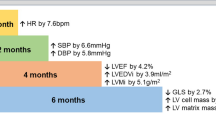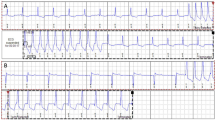Abstract
The genetic basis of many sudden death-related conditions has been elucidated. These include inherited arrhythmias and arrhythmogenic cardiomyopathies, termed inherited heart rhythm disorders (IHRD). Advising on and interpreting genetic testing is challenging for the general cardiologist. This has led to the development of interdisciplinary clinics for IHRD in varying stages of establishment in Canada. We sought the viewpoints and patterns of practice of Canadian IHRD experts, and assessed their ability to access genetic testing for IHRD using a national cross-sectional survey. Of 56 participants, most were physicians (68%) or genetic counselors (19%). Despite working collaboratively, most genetic counselors (59%) were either not satisfied or only somewhat satisfied with their relationships with physicians. Ninety percent of participants were involved in offering genetic evaluation, including 80% who felt that testing was usually/always accessible. Most offered genetic testing to confirm clinical diagnosis and/or direct family screening. Post-mortem genetic analysis was sought by 69% of respondents; however, a lack of retained tissue and/or poor tissue preparation hindered this process. Family screening was usually recommended in the setting of a pathogenic/likely pathogenic variant. The most commonly perceived barrier to genetic testing was cost to the healthcare system. More than a quarter of patients waited ≥ 6 months for funding. An ability to engage at-risk relatives was rated as limited/poor by 34% of participants. Despite the establishment of several interdisciplinary clinics, timely access to affordable testing, supported by strong team communication, continues to be a barrier to genetic testing in Canada.


Similar content being viewed by others
References
Ackerman MJ (2015) Genetic purgatory and the cardiac channelopathies: exposing the variants of uncertain/unknown significance issue. Heart Rhythm 12(11):2325–2331. https://doi.org/10.1016/j.hrthm.2015.07.002
Ackerman MJ, Priori SG, Willems S, Berul C, Brugada R, Calkins H, Zipes DP (2011) HRS/EHRA expert consensus statement on the state of genetic testing for the channelopathies and cardiomyopathies this document was developed as a partnership between the Heart Rhythm Society (HRS) and the European Heart Rhythm Association (EHRA). Heart Rhythm 8(8):1308–1339. https://doi.org/10.1016/j.hrthm.2011.05.020
Adler A, Sadek MM, Chan AY, Dell E, Rutberg J, Davis D, Gollob MH (2016) Patient outcomes from a specialized inherited arrhythmia clinic. Circ Arrhythm Electrophysiol 9(1):e003440. https://doi.org/10.1161/circep.115.003440
Bagnall RD, Weintraub RG, Ingles J, Duflou J, Yeates L, Lam L, Semsarian C (2016) A prospective study of sudden cardiac death among children and young adults. N Engl J Med 374(25):2441–2452. https://doi.org/10.1056/NEJMoa1510687
Caleshu C, Kasparian NA, Edwards KS, Yeates L, Semsarian C, Perez M, Ingles J (2016) Interdisciplinary psychosocial care for families with inherited cardiovascular diseases. Trends Cardiovasc Med 26(7):647–653. https://doi.org/10.1016/j.tcm.2016.04.010
Erskine KE, Griffith E, Degroat N, Stolerman M, Silverstein LB, Hidayatallah N, Dolan SM (2013) An interdisciplinary approach to personalized medicine: case studies from a cardiogenetics clinic. Per Med 10(1):73–80. https://doi.org/10.2217/pme.12.108
Gollob MH, Blier L, Brugada R, Champagne J, Chauhan V, Connors S, Woo A (2011) Recommendations for the use of genetic testing in the clinical evaluation of inherited cardiac arrhythmias associated with sudden cardiac death: Canadian Cardiovascular Society/Canadian Heart Rhythm Society joint position paper. Can J Cardiol 27(2):232–245. https://doi.org/10.1016/j.cjca.2010.12.078
Grosse SD, Schechter MS, Kulkarni R, Lloyd-Puryear MA, Strickland B, Trevathan E (2009) Models of comprehensive multidisciplinary care for individuals in the United States with genetic disorders. Pediatrics 123(1):407–412. https://doi.org/10.1542/peds.2007-2875
Herman AR, Cheung C, Gerull B, Simpson CS, Birnie DH, Klein GJ, Krahn AD (2016) Outcome of apparently unexplained cardiac arrest: results from investigation and follow-up of the prospective cardiac arrest survivors with preserved ejection fraction registry. Circ Arrhythm Electrophysiol 9(1):e003619. https://doi.org/10.1161/circep.115.003619
Hofman N, Tan HL, Alders M, Kolder I, de Haij S, Mannens MM, Wilde AA (2013) Yield of molecular and clinical testing for arrhythmia syndromes: report of 15 years' experience. Circulation 128(14):1513–1521. https://doi.org/10.1161/circulationaha.112.000091
Ingles J, Spinks C, Yeates L, McGeechan K, Kasparian N, Semsarian C (2016) Posttraumatic stress and prolonged grief after the sudden cardiac death of a young relative. JAMA Intern Med 176(3):402–405. https://doi.org/10.1001/jamainternmed.2015.7808
Janzen ML, Cheung C, Sanatani S, Cunningham T, Kerr C, Steinberg C, Sherwin E, Arbour L, Deyell MW, Andrade JG, Lehman AM, Gula LJ, Krahn AD (2017) Cost analysis of patients referred for inherited heart rhythm disorder evaluation. Can J Cardiol 33(6):814–821. https://doi.org/10.1016/j.cjca.2016.12.009
Krahn AD, Healey JS, Chauhan V, Birnie DH, Simpson CS, Champagne J, Gollob MH (2009) Systematic assessment of patients with unexplained cardiac arrest: cardiac arrest survivors with preserved ejection fraction registry (CASPER). Circulation 120(4):278–285. https://doi.org/10.1161/circulationaha.109.853143
Lim et al (2010) A review of sudden unexpected death in the young in British Columbia. Can J Cardiol 26(1):22–26. https://doi.org/10.1016/S0828-282X(10)70329-9
Mellor G, Laksman ZWM, Tadros R, Roberts JD, Gerull B, Simpson CS, Krahn AD (2017) Genetic testing in the evaluation of unexplained cardiac arrest: from the CASPER (cardiac arrest survivors with preserved ejection fraction registry). Circ Cardiovasc Genet 10(3):e001686. https://doi.org/10.1161/circgenetics.116.001686
Priori SG (2013) HRS/EHRA/APHRS expert consensus statement on the diagnosis and management of patients with inherited primary arrhythmia syndromes: document endorsed by HRS, EHRA, and APHRS in May 2013 and by ACCF, AHA, PACES, and AEPC in June 2013. Heart Rhythm 10(12):1932–1963. https://doi.org/10.1016/j.hrthm.2013.05.014
Priori SG, Wilde AA, Horie M, Cho Y, Behr ER, Berul C, Quek SC (2013) Executive summary: HRS/EHRA/APHRS expert consensus statement on the diagnosis and management of patients with inherited primary arrhythmia syndromes. Europace 15(10):1389–1406. https://doi.org/10.1093/europace/eut272
Richards S, Aziz N, Bale S, Bick D, Das S, Gastier-Foster J, Rehm HL (2015) Standards and guidelines for the interpretation of sequence variants: a joint consensus recommendation of the American College of Medical Genetics and Genomics and the Association for Molecular Pathology. Genet Med 17(5):405–424. https://doi.org/10.1038/gim.2015.30
Somani R, Krahn AD, Healey JS, Chauhan VS, Birnie DH, Champagne J, Simpson CS (2014) Procainamide infusion in the evaluation of unexplained cardiac arrest: from the cardiac arrest survivors with preserved ejection fraction registry (CASPER). Heart Rhythm 11(6):1047–1054. https://doi.org/10.1016/j.hrthm.2014.03.022
Steinberg C, Padfield GJ, Champagne J, Sanatani S, Angaran P, Andrade JG, Krahn AD (2016) Cardiac abnormalities in first-degree relatives of unexplained cardiac arrest victims: a report from the cardiac arrest survivors with preserved ejection fraction registry. Circ Arrhythm Electrophysiol 9(9):e004274. https://doi.org/10.1161/circep.115.004274
Torkamani A, Muse ED, Spencer EG, Rueda M, Wagner GN, Lucas JR, Topol EJ (2016) Molecular autopsy for sudden unexpected death. JAMA 316(14):1492–1494. https://doi.org/10.1001/jama.2016.11445
Vittoria Matassini M, Krahn AD, Gardner M, Champagne J, Sanatani S, Birnie DH, Healey JS (2014) Evolution of clinical diagnosis in patients presenting with unexplained cardiac arrest or syncope due to polymorphic ventricular tachycardia. Heart Rhythm 11(2):274–281. https://doi.org/10.1016/j.hrthm.2013.11.008
Acknowledgements
The authors thank the survey participants. This study was unfunded. Dr. Roston is supported by the Queen Elizabeth II Graduate Scholarship at the University of Alberta. Drs. Sanatani and Krahn hold grants from the Heart and Stroke Foundation of Canada (G-13-0002775 and G-14-0005732), and Dr. Krahn receives support from the Canadian Institute of Health Research (343256). Dr. Laksman is the UBC Dr. Charles Kerr Distinguished Scholar in Cardiovascular Genetics. Dr. Krahn is the Sauder Family and Heart and Stroke Foundation Chair in Cardiology, and the Paul Brunes Chair in Heart Rhythm Disorders.
Author information
Authors and Affiliations
Corresponding author
Ethics declarations
Conflict of interest
None of the authors have any conflicts of interest to declare, and all had full access to the data, contributed to the study, and take responsibility for its integrity.
Human studies and informed consent
All procedures followed were in accordance with the ethical standards of the Helsinki Declaration of 1975, as revised in 2000 (5). Consent for participation was presumed based on a willingness to complete the survey, and respondents could remain anonymous at their own discretion.
Animal studies
No animal studies were carried out by the authors for this article.
Electronic supplementary material
Supplemental Figure S1
A sample of the study survey. (DOCX 23 kb)
Rights and permissions
About this article
Cite this article
Roston, T.M., Dewar, L., Franciosi, S. et al. The accessibility and utilization of genetic testing for inherited heart rhythm disorders: a Canadian cross-sectional survey study. J Community Genet 9, 257–262 (2018). https://doi.org/10.1007/s12687-017-0348-y
Received:
Accepted:
Published:
Issue Date:
DOI: https://doi.org/10.1007/s12687-017-0348-y




